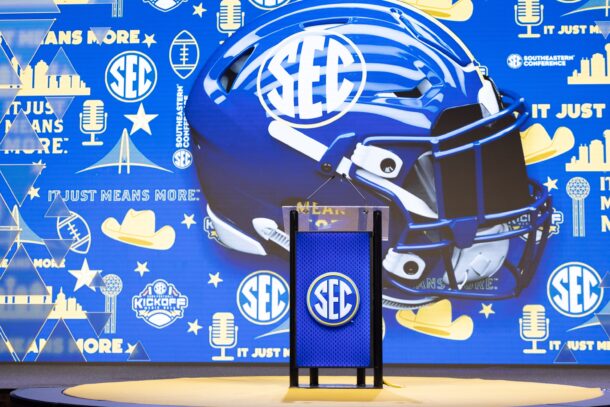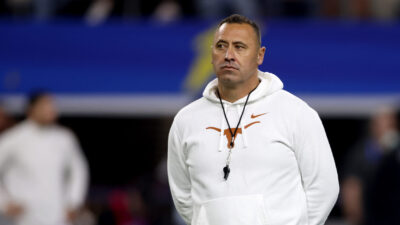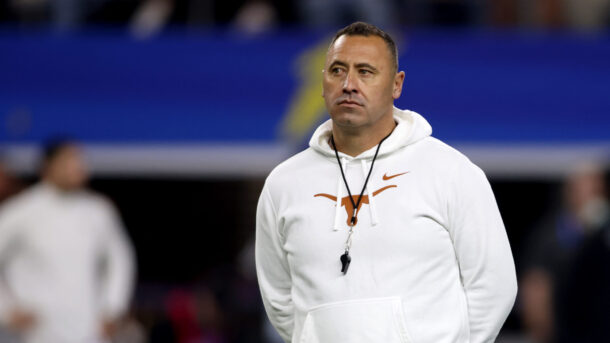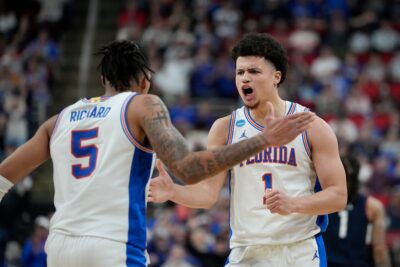Ad Disclosure
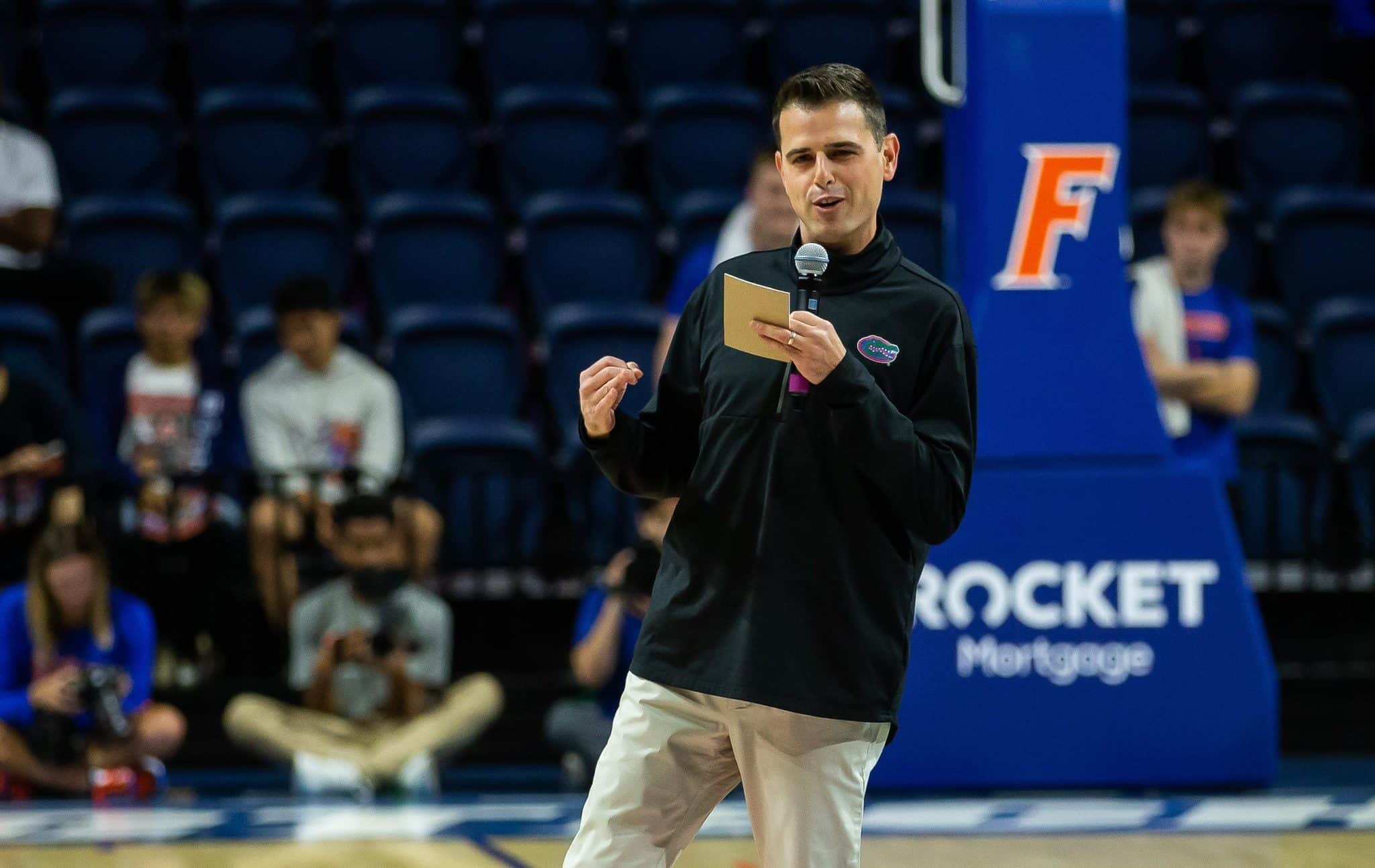
Inside the cozy confines of Exactech Arena, a cold night in Gainesville grew chiller last February with 15 minutes to play in a lopsided basketball game.
That’s when Colin Castleton, Florida’s All-SEC center and the eventual SEC Defensive Player of the Year, jammed his hand awkwardly in a collision with Ole Miss forward Jaemyn Brakefield. Castleton limped off the floor immediately, holding his right wrist and grimacing in pain. Suddenly, an innocent basketball play in a lopsided win turned into a broken hand and season-ending injury.
Castleton averaged 16.5 points, 7.9 rebounds and 3.0 blocks prior to being injured, and he anchored a Florida defense that spent most the season ranked in the top 25 nationally from an efficiency standpoint. Without the big man in the middle to protect the rim and collect rebounds, Florida fell apart defensively, and an offense that struggled most the season could not pick up the slack. The result? The Gators won only twice after Castleton’s injury and were relegated to the NIT for the second consecutive season.
At a program that has missed the NCAA Tournament just 4 times this century, it was a tough pill to swallow for Gators fans, and an ignominious beginning to the Todd Golden era, as the first-year head coach suffered Florida’s first losing season since the final year of the Billy Donovan regime, and just the second for the Gators in 27 years.
“I thought toward the middle of conference play we kind of figured ourselves out,” Golden told assembled media at SEC Media Days. “We were 6-3, playing really good. Colin goes down. We just didn’t have enough behind him to weather that storm.”
The biggest reason Florida couldn’t overcome the late-season Castleton injury was the lack of any identity offensively.
At Florida, basketball teams that struggle to score have become a bit of an unfortunate staple.
Mike White took the Gators to 4 NCAA Tournaments (and would have made a 5th but for the COVID year), but Florida never won a SEC championship in large part because they lacked an identity on offense. In all 4 of White’s final seasons in Gainesville, the Gators tweaked or installed a new offensive system in the middle of the season in an effort to jumpstart moribund offensive execution. With the exception of flashes from when the program featured a healthy Keyontae Johnson or a late sophomore year star-turn from Tre Mann, nothing worked.
“(Mike White) and his staff never really figured out what they wanted to be offensively, right? They wanted to dribble drive but didn’t recruit to it. They wanted to play fast but didn’t let Andrew Nembhard play fast. They wanted to be super set reliant but only used about half the Princeton concepts when they had super high IQ kids like Kerry Blackshear and Keyontae Johnson and Noah Locke. They always guarded you, but the program’s identity was that they didn’t have an identity,” an SEC coach told SDS last month.
Golden, who built a basketball analytics darling at San Francisco, hoped to change that in Year 1. He preached offensive rebounding, low turnovers and plenty of second-chance points, but his first Gators team finished last in the SEC in offensive rebounding and 11th in 3-point shooting percentage, a nightmarish cocktail that offset the fact that senior point guard Kyle Lofton and the offense took excellent care of the ball, ranking among the nation’s best teams in turnover percentage.
There were schematic questions, too.
Beyond Castleton, the Gators were a middling pick-and-roll team, and their best pick-and-roll guard, Trey Bonham (.964 points per possession in that situation, per Synergy, well above any other guard on the roster) was relegated to a bench role by midseason. That would be fine in an offense that wasn’t continuity ball screen, but given the predictable nature of that scheme and its tendency to take the ball out of the hands of your best player at times, it made for a frustrating watch.
Golden’s frustrations about the Castleton injury are understandable, and were shared by Florida’s fan base, but the reality of that injury’s impact on the season’s bottom line is more complex.
The Gators were just 13-12 when Castleton was injured, and while there were nice moments, including a blowout win over Tennessee, there were not enough feathers on Florida’s résumé to suggest the Gators were going dancing if Castleton remained healthy. Further, while there were bright spots after Castleton’s injury, most notably the rise of freshman guard Riley Kugel, who averaged 17.3 points on 50% shooting and 40% 3-point shooting over the season’s final 10 games, the Gators were embarrassed by a mediocre UCF team on their home floor in the opening round of the NIT, cementing a losing season.
Golden responded to season one shortcomings by signing one of the nation’s best transfer classes, although one of the key pieces, Yale forward Edge Jarvis, has retired from basketball for personal reasons since inking with the Gators. Still, Florida’s backcourt received a huge boost when Iona star Walter Clayton elected to return to his home state and play for the Gators, and in UC Riverside guard Zyon Pullin the Gators added a silky point guard who can score and impact winning in a variety of ways. The Gators also added Seton Hall starter Tyrese Samuel, one of the nation’s best interior defenders, as well as Micah Handlogten, the Sun Belt Freshman of the Year, to the frontcourt, giving the program a 7-footer with multiple years of eligibility.
In addition to transfers, the staff is confident in their own evaluations on the recruiting trail, and they believe they have impact freshmen in Thomas Haugh, a 6-9 wing who can play 3 positions comfortably, and Alex Condon, an Australian international from the country’s NBA Centre for Excellence program who is explosive and athletic and just beginning to tap into how good he can be after giving up Australian football for basketball only 2 years ago.
In ways that Golden’s first roster was transitional and featured holdovers from the White era, this roster is uniquely his own. Will that pay dividends?
Golden believes this team is deeper and more balanced than the one that fell short of preseason Top 25, NCAA Tournament expectations last year.
“I feel like we have a good team,” Golden said at SEC Media Days. “I feel like we’ve grown and gotten better. I feel like we are deeper, more balanced, will be able to rebound better and get second chance points and do the things you need to do in this league. We’ve had a successful off-season. But until you go play someone, you don’t know.”
Early returns in “secret scrimmages” were positive.
Florida beat a Miami squad returning 3 starters from its Final Four team in Coral Gables, doing it with the balanced inside-out offense Golden hoped he’d see in year 2 at the helm. A blowout win over FIU at home last week also added confidence.
The real games, of course, begin Monday. A huge tilt with Virginia, one of the storied programs in the sport, looms Friday in Charlotte.
Golden understands the expectations. That’s why he wanted the job — why most anyone would want the job.
Florida hasn’t gone 3 seasons without an NCAA Tournament berth sine the early 1990s. Florida hasn’t suffered back-t0-back losing seasons since 1989-1991. Of SEC programs this century, only Kentucky has won more basketball games.
“That’s a monster down there, from a recruiting base standpoint, an administrative support standpoint, a tradition standpoint,” an SEC coach told SDS at Media Days. “It’s a job most everyone would want. Too many advantages to be down too long.”
For Todd Golden, cashing in on those advantages starts in Year 2.
Neil Blackmon covers Florida football and the SEC for SaturdayDownSouth.com. An attorney, he is also a member of the Football and Basketball Writers Associations of America. He also coaches basketball.
